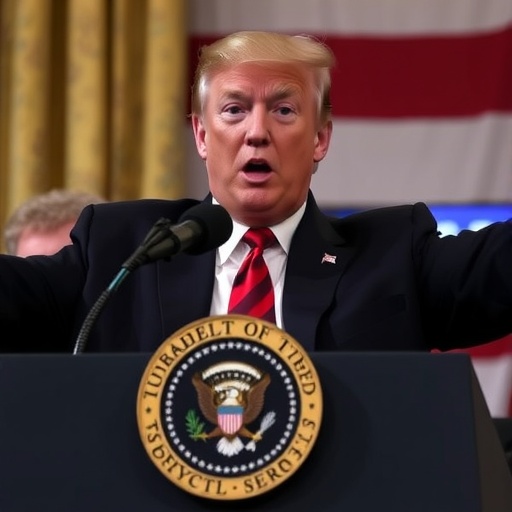Trump Rejects Democratic Demands as ‘Crazy’ in Escalating Standoff Over Government Funding and Health Care Subsidies
In a bold and unyielding statement from the White House, President Donald Trump has dismissed Democratic demands for negotiations on extending critical health care subsidies, labeling them outright as ‘crazy.’ This sharp rebuke comes as the two major parties dig in their heels over government funding, raising fears of another potential shutdown that could disrupt essential services and economies across the nation. With the current funding deadline looming just weeks away, Trump‘s comments have poured cold water on hopes for bipartisan compromise, leaving lawmakers scrambling for a path forward amid heightened political tensions.
- Trump’s Fiery Rhetoric Ignites Fresh Tensions in Health Care Subsidies Debate
- Democrats Dig In on Subsidy Protections Amid Mounting Pressure
- Past Shutdowns Haunt Current Government Funding Negotiations
- Expert Warnings Highlight Risks of Failed Bipartisan Deal on Subsidies
- Path Forward: Looming Deadlines and Potential Avenues for Resolution
The standoff centers on the extension of Affordable Care Act (ACA) subsidies, which have been a lifeline for millions of low- and middle-income Americans seeking health insurance. These subsidies, originally set to expire at the end of the year, help offset premium costs, making coverage more accessible. Democrats argue that allowing them to lapse would betray working families and exacerbate healthcare disparities, while Trump and his Republican allies view the program as an overreach of federal spending that needs reform or cuts. As negotiations stall, the rhetoric has intensified, with both sides accusing the other of playing politics with people’s lives.
Trump’s dismissal was delivered during a press briefing on Thursday, where he reiterated his administration’s stance against what he called ‘reckless Democratic spending sprees.’ ‘These demands are crazy,’ Trump stated emphatically, according to reports from the scene. ‘We’re not going to let the radical left hold the government hostage over failed Obama-era policies.’ This marks a significant escalation in the ongoing battle over government funding, where Republicans push for tighter fiscal controls and Democrats champion protections for social programs.
Trump’s Fiery Rhetoric Ignites Fresh Tensions in Health Care Subsidies Debate
President Trump’s characterization of Democratic proposals as ‘crazy’ has struck a nerve in Washington, amplifying the divide that has plagued negotiations for months. Speaking to reporters outside the Oval Office, Trump didn’t mince words, framing the Democrats’ push to extend health care subsidies as an attempt to expand what he termed ‘socialist healthcare.’ This isn’t the first time Trump has used such language; during his 2020 reelection campaign, he frequently criticized the ACA as a ‘disaster,’ vowing to replace it with something ‘better and cheaper’—a promise that remains unfulfilled.
Democratic leaders, including House Speaker Nancy Pelosi and Senate Minority Leader Chuck Schumer, fired back swiftly. Pelosi, in a statement released hours after Trump’s remarks, accused him of ‘sabotaging American families’ by refusing to engage in good-faith talks. ‘The President’s words are not just inflammatory; they’re dangerous,’ she said. ‘Extending these subsidies isn’t optional—it’s essential for 20 million Americans who rely on them to afford basic medical care.’ Schumer echoed this sentiment on the Senate floor, warning that Trump’s intransigence could lead to ‘unnecessary suffering’ if government funding lapses.
The roots of this conflict trace back to the 2010 passage of the ACA under President Barack Obama, which introduced premium tax credits to make insurance marketplaces viable. According to the Kaiser Family Foundation, these health care subsidies reduced out-of-pocket premiums by an average of 80% for eligible enrollees in 2023, covering costs for households earning up to 400% of the federal poverty level. Without extension, experts predict a spike in uninsured rates, potentially adding 4 million more Americans to that roster by 2025, per a recent Urban Institute analysis.
Trump’s administration has long sought to unwind parts of the ACA, including through executive actions and legal challenges. In 2017, his Department of Justice declined to defend key provisions in court, leading to ongoing litigation. Now, with midterm elections approaching, both parties are leveraging the issue for political gain. Republicans in Congress, aligned with Trump, argue that the subsidies inflate federal deficits—estimated at $100 billion annually—and divert funds from other priorities like infrastructure and defense.
Democrats Dig In on Subsidy Protections Amid Mounting Pressure
As Trump doubles down on his rejection, Democrats are rallying around a unified front to safeguard health care subsidies, viewing the extension as a non-negotiable red line in broader government funding talks. Senate Democrats have introduced legislation, the Health Care Affordability Act, which would not only extend the subsidies through 2028 but also enhance them with additional pandemic-era relief measures. The bill, co-sponsored by 45 Democratic senators, aims to cap premiums at 8.5% of income for all enrollees, a move projected to cost $250 billion over the next decade but save families an average of $700 annually on premiums.
Key Democratic figures are framing the fight as a moral imperative. Representative Pramila Jayapal, chair of the Progressive Caucus, told CNN that ‘abandoning these subsidies would be a death sentence for the ACA and for vulnerable communities.’ She highlighted data from the Centers for Disease Control and Prevention (CDC), which shows that subsidized coverage has contributed to a 50% drop in uninsured rates among children since 2010, from 14% to 7%. In rural areas, where hospital closures have surged—over 140 since 2010—the subsidies are credited with stabilizing local healthcare providers.
Yet, internal Democratic divisions could complicate their strategy. Moderate Democrats from swing districts, like Senator Joe Manchin of West Virginia, have expressed openness to pairing subsidy extensions with Republican demands for work requirements or fraud prevention measures. Manchin, in a recent interview with The Hill, stated, ‘I’m willing to negotiate, but not at the expense of core protections.’ This centrist stance has drawn ire from progressives, who see it as a concession that weakens their bargaining position against Trump and GOP hardliners.
On the funding front, the current continuing resolution (CR) expires on December 15, setting the stage for high-stakes negotiations. Last year’s funding battles led to a 35-day partial shutdown—the longest in U.S. history—costing an estimated $11 billion in economic output, according to the Congressional Budget Office (CBO). Democrats are wary of repeating that scenario, especially with inflation at 3.2% and supply chain issues lingering, but they’re prepared to hold firm if Republicans refuse to budge on subsidies.
Past Shutdowns Haunt Current Government Funding Negotiations
The specter of previous government shutdowns looms large over the current impasse, serving as a stark reminder of the high costs of failed negotiations between Trump and Democrats. In December 2018, a dispute over border wall funding resulted in federal agencies closing for over a month, furloughing 800,000 workers and delaying payments to contractors. That episode, which Trump himself called a ‘shutdown for the wall,’ ended without significant wall construction progress and damaged his approval ratings among independents by 10 points, per Gallup polls.
Historical context reveals a pattern of partisan gridlock on government funding. Under Trump, there were three shutdowns totaling 77 days, far exceeding the Obama era’s 21 days across 16 years. Economists from the Brookings Institution estimate that each day of shutdown costs the economy $160 million in lost productivity, with ripple effects on GDP growth. For health care subsidies, the 2018-2019 shutdown delayed subsidy payments, causing a temporary 12% dip in marketplace enrollments, as reported by the Department of Health and Human Services (HHS).
Republican leaders, including Senate Majority Leader Mitch McConnell, are urging Trump to avoid another crisis. In a closed-door meeting last week, McConnell reportedly advised prioritizing defense spending and disaster relief in any omnibus bill, sidelining subsidies as a ‘future fight.’ House Minority Leader Kevin McCarthy has similarly called for ‘fiscal responsibility,’ proposing to offset subsidy costs with cuts to green energy programs—a non-starter for Democrats.
Stakeholders beyond Congress are feeling the pinch. The American Hospital Association (AHA) has warned that subsidy lapses could increase uncompensated care costs by $50 billion yearly, straining underfunded hospitals. Patient advocacy groups like Families USA are mobilizing grassroots campaigns, with petitions garnering over 500,000 signatures urging extension. ‘This isn’t politics; it’s survival,’ said one organizer in a press release.
Expert Warnings Highlight Risks of Failed Bipartisan Deal on Subsidies
As the deadline approaches, policy experts are sounding alarms about the broader implications of the Trump-led rejection of Democratic demands, predicting widespread fallout if health care subsidies aren’t extended. Dr. Ezekiel Emanuel, a former Obama healthcare advisor and Wharton professor, wrote in a New York Times op-ed that without action, ‘premiums could skyrocket by 20-30%, pricing out young and healthy enrollees and destabilizing the entire market.’ He cited CBO projections showing that subsidy expiration would add $1.5 trillion to federal deficits over a decade due to increased emergency room visits and untreated chronic conditions.
From an economic standpoint, the Peterson Institute for International Economics forecasts that a funding lapse could shave 0.2% off U.S. GDP in the first quarter of next year, exacerbating labor shortages in healthcare. ‘Government shutdowns don’t just close doors; they close opportunities,’ said institute director Adam Posen in a briefing. Insurance giants like UnitedHealth Group have already signaled rate hikes if subsidies vanish, potentially affecting 15 million policyholders.
International observers are watching closely, with the World Health Organization (WHO) noting that U.S. healthcare instability could hinder global efforts on issues like pandemic preparedness. Domestically, polls from Pew Research indicate 62% of Americans support extending the subsidies, crossing party lines—55% of Republicans agree when framed as ‘affordable care for families.’ This public sentiment pressures lawmakers, yet partisan loyalty often trumps voter will in negotiations.
Behind-the-scenes efforts include backchannel talks led by White House Chief of Staff Ron Klain and Senate negotiators. Sources familiar with the discussions tell Reuters that a compromise might involve a one-year subsidy extension tied to infrastructure investments, but Trump’s public stance has chilled momentum. ‘The President’s words set the tone, and right now, it’s combative,’ one anonymous aide confided.
Path Forward: Looming Deadlines and Potential Avenues for Resolution
With government funding talks teetering on the edge, the path ahead for resolving the health care subsidies dispute remains fraught but not impossible. Congress returns from recess next week, giving lawmakers a narrow window to craft a deal before the December 15 deadline. Bipartisan groups, such as the Problem Solvers Caucus, are floating hybrid proposals: extending subsidies for two years in exchange for Republican wins on immigration enforcement and tax code tweaks.
Trump has hinted at flexibility in private, telling Fox News that he’s ‘open to deals that make America stronger,’ but his ‘crazy’ label has hardened lines. If no agreement is reached, a short-term CR could buy time, though repeated patches risk eroding public trust—only 28% of Americans approve of Congress’s handling of funding, per a Monmouth University poll. Long-term, the issue may head to the Supreme Court, where ACA challenges persist.
Looking beyond the immediate crisis, experts urge structural reforms. The Bipartisan Policy Center recommends a permanent subsidy framework decoupled from annual funding battles, potentially saving $300 billion in administrative costs over time. For families, community health centers are preparing contingency plans, including expanded free clinics to mitigate coverage gaps. As Trump and Democrats navigate this minefield, the stakes couldn’t be higher: a functional government or another round of chaos that echoes through every American household.








